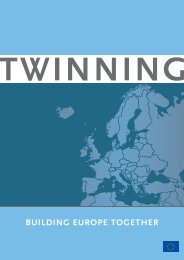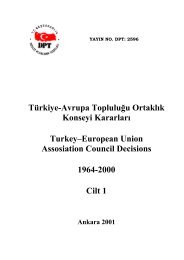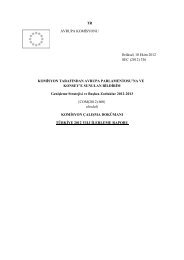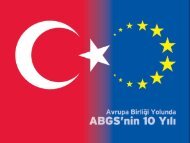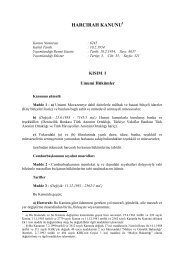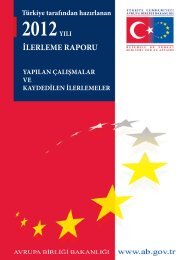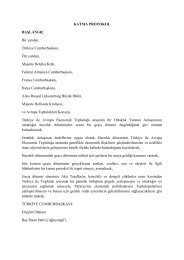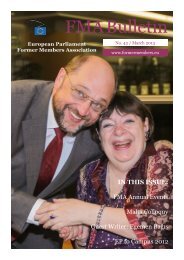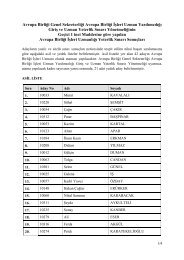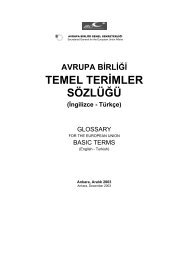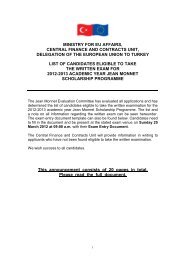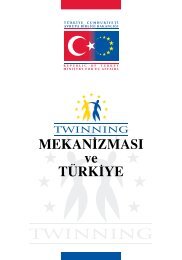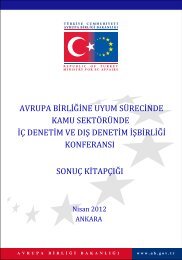2010 ilerleme raporu - Avrupa BirliÄi BakanlıÄı
2010 ilerleme raporu - Avrupa BirliÄi BakanlıÄı
2010 ilerleme raporu - Avrupa BirliÄi BakanlıÄı
Create successful ePaper yourself
Turn your PDF publications into a flip-book with our unique Google optimized e-Paper software.
The amended Law on fundamental principles of elections and the electoral registry entered<br />
into force on 10 April <strong>2010</strong>, de facto allowing use of Kurdish in election campaigns.<br />
However, use of any language other than Turkish in political life is still illegal under the Law<br />
on elections and political parties. The courts have been issuing contradictory decisions in<br />
court cases against Kurdish politicians.<br />
Diyarbakır High Criminal Court No 4 banned 13 members of Bahar Cultural Centre (BKM)<br />
from performing arts for one year. The court ruled that the 13 artists ‘may not take part in any<br />
social and artistic events’. Members of the BKM Music and Theatre Group were punished for<br />
performing at the Batman Cultural Festival, Newroz celebrations and press gatherings. The<br />
musicians and artists were charged with ‘violating the law on assembly and demonstrations’.<br />
One musician has been in pre-trial detention. 13 artists and musicians were each given 10-<br />
month prison sentences.<br />
In practice, children whose mother tongue is not Turkish cannot learn their mother tongue in<br />
either private or public schools.<br />
No measures have been taken to facilitate access to public services for non-speakers of<br />
Turkish. While interpretation during the investigation phase and court hearing is possible<br />
under the current legislation for suspects, victims or witnesses, it is not consistently applied in<br />
practice.<br />
There have been improvements in use of the Kurdish language in prisons. However, this is<br />
still restricted because of security concerns and implementation varies between prison<br />
administrations. (See chapter on Prisons).<br />
As regards Roma, the government launched an ‘opening’, including a workshop and a<br />
meeting with the Prime Minister in March.<br />
The government submitted to parliament a proposal to amend a discriminatory clause in the<br />
Law on the movement and residence of aliens 30 , which authorises ‘the Ministry of the Interior<br />
to expel stateless and non-Turkish gypsies and aliens that are not bound to the Turkish<br />
culture’.<br />
In June, the Ministry of the Interior asked all governors about the housing needs of the Roma<br />
population in each province. It also issued a circular requesting all governors to facilitate the<br />
registration of all ‘persons without a civil registry’. The registration of Roma is an important<br />
step to ensure their access to public services.<br />
However, in the absence of a comprehensive policy to address the situation of Roma, the<br />
latter still face social exclusion and marginalisation in access to education, discrimination in<br />
health services, exclusion from job opportunities, difficulties in gaining access to personal<br />
documentation and exclusion from participation in public affairs and public life.<br />
The Roma population continues to face socio-economic problems, such as poverty,<br />
displacement and lack of social services in the aftermath of the demolition in Roma districts<br />
under urban renewal programmes in various cities. In January, in western Manisa province,<br />
30<br />
Law No 5683 on the movement and residence of aliens (Article 21).<br />
EN 33 EN



